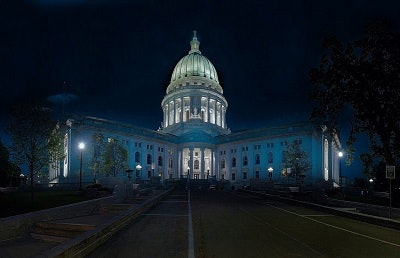The presidential election is too close to call, due largely to the unprecedented number of people who mailed in absentee ballots and conducted early voting out of heightened concern for their safety amid a global pandemic.
As of Wednesday morning, Democrat Joe Biden was leading with 224 electoral votes, with results in Michigan, North Carolina and Pennsylvania among other states still up in the air. Some experts and pundits have indicated they expect the process of counting votes to carry on for a number of days (or weeks) — in what has become one of the most highly controversial election cycles since George W. Bush was declared the winner over Al Gore in 2000 by a U.S. Supreme Court decision.

Higher education has, for better or worse, largely remained in the same place it was four years ago as the country eagerly awaited the results of the 2016 election. There has been no reauthorization of the Higher Education Act, now six years overdue. Free community college, a popular topic of conversation in the 2016 election and again in the primaries leading up to the 2020 election, lost steam. Pell grants have remained flat as well.
In the past four years, President Donald J. Trump has made himself the champion of “the poorly educated.” Yet, this industry has survived an administration that has questioned the validity of scientific research and shown a wanton disregard for facts. In fact, his administration mostly seemed disinterested in any actions that would directly impact higher education.
But the 2020 election season has brought higher education — and, in particular, historically Black colleges and universities (HBCUs) — back to the forefront of the conversation. Recognizing how critically important these institutions and their students and alumni are to the Democratic base, Joe Biden recently unveiled a $70 billion plan to support HBCUs. The plan focuses primarily on investing in infrastructure and research capacity for the institutions but also promises increases to the federal Pell grant program and broad student debt relief.
Lodriguez Murray, the senior vice president government and student affairs at the United Negro College Fund (UNCF), said the organization is hoping to see Pell grant awards double in the next administration.
“It’s time to restore the purchasing power of the Pell grant, especially during the time of this global pandemic that disproportionately impacts African Americans, and there needs to be some kind of recognition for the pervasive racism that has existed in this country for centuries,” he said. Three in four HBCU students receive the Pell grant, and 81% take out student loans, added Murray.
Trump touts among his victories historic funding for HBCUs as well as implementing the year-round distribution of the Pell grant, though the latter was actually set into motion by his predecessor, Barack Obama, and the former is actually more accurately reflected as a win from Congress. Murray said he does wonder about the impact of having lost Senator Kamala Harris as a champion for the institutions in the U.S. Senate.
However, Clark Atlanta University president, Dr. George T. French Jr., said the devaluing of research and divestment from higher education at the federal and state levels have led to the country being drastically behind in higher education and scientific discovery.
“We’re talking about everyday scientific discoveries that include the defense of our nation, as well as the convenience of how we live within our households,” he said.
Though institutions have been largely teaching institutions — rather than research institutions — “they may have the faculty and some resources to elevate to research institutions,” he added. And thus, “the federal government should provide some funding to provide them capacity building grants.”
David Baime, senior vice president of government relations and policy analysis at The American Association of Community Colleges, is hopeful that whoever is elected will work with Congress to get a resolution on Deferred Action for Childhood Arrivals (DACA) and the Development, Relief, and Education for Alien Minors Act (DREAM) to allay concerns for international students caused by the current administration. But he points out that it is really Congress — and which party takes control of the House and Senate — that will have the greatest impact on higher ed policy.
“If the Democrats retake the Senate, even if they don’t eliminate the filibuster, they would have the ability to pass a reconciliation bill” that could have several policy implications for higher education, he said. Of particular interest to the HBCU community, said Murray, are Senate races in Georgia, where Morehouse graduate Reverend Raphael Warnock (D) was vying for a seat, and South Carolina, where Democrat Jaime Harrison was hoping to unseat longtime U.S. Senator and Trump supporter Lindsey Graham (R). The race was called for Graham Tuesday evening.
Both the Chair and Ranking Member seats on the Senate Committee on Health, Labor, Education, and Pensions are up for grabs in the next Congress, and those individuals will also play a large role in the future of any higher education policies and funding directives.


















